|
|
|
Sort Order |
|
|
|
Items / Page
|
|
|
|
|
|
|
| Srl | Item |
| 1 |
ID:
094701
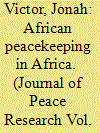

|
|
|
|
|
| Publication |
2010.
|
| Summary/Abstract |
Since the end of the Cold War, sub-Saharan African states have substantially increased their participation in international peacekeeping operations in Africa. Their contributions have become highly valued and even facilitated by major powers. This article examines why certain African states might contribute more than others to peacekeeping. In particular, prominent arguments are considered about the primacy of regime security concerns and the dynamics of warlord politics in the foreign policymaking of African states, the economic incentives of peacekeeping, and the importance of African states' concerns over their state legitimacy and territorial integrity. First, this study investigates the possibility that peacekeeping might be utilized as a diversionary strategy to divert the attention of both an African state's military and major powers from a regime's misrule. Second, this study examines the extent to which financial and material assistance from donor states encourages poorer states to engage in peacekeeping. Third, the study investigates whether states with less legitimate and more arbitrary borders might have greater incentive to contribute to peacekeeping operations to promote the territorial status quo in Africa. Empirical evidence from a quantitative analysis across 47 states of sub-Saharan Africa from 1989 to 2001 suggests that states that are poorer, with lower state legitimacy and lower political repression, participate more often in regional peacekeeping.
|
|
|
|
|
|
|
|
|
|
|
|
|
|
|
|
| 2 |
ID:
094689


|
|
|
|
|
| Publication |
2010.
|
| Summary/Abstract |
What explains the effect of external intervention on the duration of civil war? The literature on intervention has made some progress in addressing this question, but it has been hindered by an assumption that states intervene in civil wars either to help one side win or to facilitate negotiations. Often, however, external states become involved in civil war to pursue an agenda which is separate from the goals of the internal combatants. When states intervene in this fashion, they make wars more difficult to resolve for two reasons. First, doing so introduces another actor that must approve any settlement to end the war. Second, external states generally have less incentive to negotiate than internal actors because they bear lower costs of fighting and they can anticipate gaining less benefit from negotiation than domestic insurgents. Through Cox regressions using data on the goals of all interventions in civil wars since World War II, this article shows that when states intervene with an independent agenda, they make wars substantially longer. The effect of independent interventions is much larger than that of external interventions generally, suggesting that the established finding that external interventions prolong civil war is driven by a subset of cases where states have intervened in conflicts to pursue independent goals.
|
|
|
|
|
|
|
|
|
|
|
|
|
|
|
|
| 3 |
ID:
094693
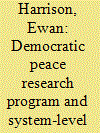

|
|
|
|
|
| Publication |
2010.
|
| Summary/Abstract |
In a path-breaking article, Wade Huntley reinterpreted Kant's pacific union as a systemic phenomenon. This generated a new wave of inquiry into the evolutionary expansion of the democratic peace. The resulting literature examines how the effects of the pacific union vary over time and with the strength of the global democratic community. It investigates the possibility that the democratic zone of peace may spread through spillover effects, socialization dynamics, and positive feedback. In so doing, it has moved democratic peace research beyond the 'separate peace' formulation. Currently, however, this literature has accumulated insights on an ad hoc basis. New hypotheses have been developed and tested without systematically considering how these insights contribute to established knowledge about the democratic peace. This article uses philosophy of science criteria to assess the contributions of the systemic democratic peace literature. It shows how systemic analysis of the democratic peace is progressive in terms of Lakatos's methodology of scientific research programs. The article first considers how Lakatosian methodology has been applied to dyadic democratic peace research. Next, it refines this account of the democratic peace research program to make it more suitable for evaluating the contributions of the systemic literature. The last section shows systemic analysis is compatible with the Lakatosian vision of a cumulative series of theories (monadic-dyadic-systemic) building logically from a core assumption. It then uses the established structure of dyadic inquiry to frame a wide-ranging agenda for a second generation of democratic peace studies.
|
|
|
|
|
|
|
|
|
|
|
|
|
|
|
|
| 4 |
ID:
094690
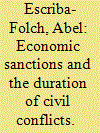

|
|
|
|
|
| Publication |
2010.
|
| Summary/Abstract |
This article studies the impact of economic sanctions on the duration and outcome of intrastate conflicts. Sanctions are argued to foster the convergence of beliefs over parties' capacity, to reduce the utility of victory and to increase the costs of continuing fighting. Using a sample of 87 wars and new data on sanctions and sanction types, the author shows that sanctions and their durations are statistically associated with shorter intrastate conflicts. It is also shown that total economic embargoes are the most effective type of coercive measure in these cases and that sanctions imposed either by international organizations or by other actors have similar negative effects on war duration. In the second part of the article, the dependent variable is disaggregated, and I demonstrate that sanctions imposed by international institutions increase the likelihood of conflict resolution, whereas those sanctions not imposed by such institutions tend to increase the probability of a military victory. Moreover, if the targeted state is a member of the international institution imposing the sanctions, the effect of such coercion is even greater. Economic embargoes are also proven to increase the likelihoods of a military and a negotiated end, whereas international arms embargoes reduce the likelihood of a military victory.
|
|
|
|
|
|
|
|
|
|
|
|
|
|
|
|
| 5 |
ID:
094695
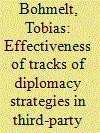

|
|
|
|
|
| Publication |
2010.
|
| Summary/Abstract |
International mediation is not conducted solely by official actors such as states or international organizations. Non-official parties such as individuals and non-governmental organizations increasingly intervene as third-party mediators in conflicts. Both official and unofficial interventions are conceptualized as tracks of diplomacy (ToDs). Even though there is a vast quantitative literature on international mediation, most studies focusing on ToDs have been qualitative and produced few generalizable insights. This article extends the existing literature on third-party intervention by developing a theoretical model to explain the effectiveness of different ToDs, which is then empirically tested in a first large-N study. The findings indicate that the leverage and resources of ToDs determine outcome effectiveness. Track One Diplomacy, that is, efforts by official actors, tends to be the most effective form of intervention as greater leverage and more resources invested can make track intervention more effective. It is also found that combined mediation efforts of both official and unofficial tracks can be more effective than independent track actions. Since conflicts with mediation are unlikely to be a randomly selected set, a selection estimator is used to test the hypotheses on effectiveness. The empirical findings support the theory and demonstrate that the specific type of mediating actor seems highly important.
|
|
|
|
|
|
|
|
|
|
|
|
|
|
|
|
| 6 |
ID:
094691
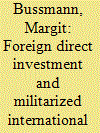

|
|
|
|
|
| Publication |
2010.
|
| Summary/Abstract |
Liberals claim that countries avoid conflict in order not to disrupt economically beneficial exchange. The statement that economic integration reduces the likelihood of conflict is largely based on the effects of trade. A similar rationale can be applied to economic interdependence in the form of international capital exchange. A state is expected to avoid political risk, especially severe forms such as militarized disputes, in order not to deter investors. This study tests, on the dyadic and monadic levels of analyses, whether the liberal peace proposition holds when economic integration is operationalized as foreign direct investment (FDI) stocks, inflows, and outflows. The results for the years 1980-2000 indicate that inflows and stock of foreign investment reduce the risk of an outbreak of a fatal dispute, regardless of whether they are tested in a single equation or a simultaneous equation model. Thus, reverse causality does not bias the pacifying effect of foreign investment inflows and stock. The results also support the underlying notion of the commercial peace that militarized conflicts inhibit foreign investment. The onset of a fatal conflict reduces FDI inflows, and, if tested in a two-stage instrumental variable approach, FDI stock, the most complete measure of economic integration through foreign investment. Accounting for endogeneity seems particularly important when analyzing the link between the onset of fatal disputes and the outflow of FDI.
|
|
|
|
|
|
|
|
|
|
|
|
|
|
|
|
| 7 |
ID:
094696
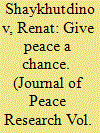

|
|
|
|
|
| Publication |
2010.
|
| Summary/Abstract |
This study examines factors that predict the formation of territorial autonomy arrangements for regionally concentrated ethnic communities. Territorial autonomies are institutional arrangements that allow ethnic groups to express their distinct identities while keeping the borders of host states intact. Although an extensive literature has investigated the capacity of autonomy arrangements to manage interethnic disputes, little research has addressed the precise origins of these institutions. The existing literature considers violent tactics as a primary factor that enables ethnic collectivities to attain territorial autonomy. In this study, the reasoning from the extant literature is juxtaposed with the arguments developed in the research on nonviolent opposition. Nonviolent movements enjoy moral advantage vis-à-vis violent groups. Moreover, peaceful tactics have the advantage of garnering attention for the concerns of ethnic groups without the liability of provoking the animosity or distrust created by violent conflict. Based on the analysis of a dataset representing 168 ethnic groups across 87 states from 1945 to 2000, it is found that the peaceful tactics groups employ when seeking greater self-rule is the single strongest predictor of the formation of autonomy arrangements. In particular, this study concludes that groups that rely on peaceful tactics, such as protests and strikes, and demand territorial autonomy, as opposed to an outright independence, have a greater potential to achieve territorial autonomy in comparison to those groups making extreme demands through the use of violence.
|
|
|
|
|
|
|
|
|
|
|
|
|
|
|
|
| 8 |
ID:
094704
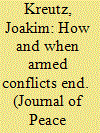

|
|
|
|
|
| Publication |
2010.
|
| Summary/Abstract |
This article presents new data on the start and end dates and the means of termination for armed conflicts, 1946-2005. These data contribute to quantitative research on conflict resolution and recurrence in three important respects: the data cover both interstate and intrastate armed conflicts, the data cover low-intensity conflicts, and the data provide information on a broad range of termination outcomes. In order to disaggregate the UCDP-PRIO Armed Conflict dataset into multiple analytical units, this dataset introduces the concept of conflict episodes, defined as years of continuous use of armed force in a conflict. Using these data, general trends and patterns are presented, showing that conflicts do not exclusively end with decisive outcomes such as victory or peace agreement but more often under unclear circumstances where fighting simply ceases. This pattern is consistent across different types of conflict, as is the finding that victories are more common in conflicts with short duration. The article then examines some factors that have been found to predict civil war recurrence and explores whether using the new dataset produces similar results. This exercise offers a number of interesting new insights and finds that the determinants for civil war recurrence identified in previous research are sensitive to alternate formulations of conflict termination data. The findings suggest that intrastate conflicts are less likely to recur after government victories or after the deployment of peacekeepers. If the previous conflict is fought with rebels aiming for total control over government or if the belligerents mobilized along ethnic lines, the risk of recurrence increases. The discrepancy in findings with previous research indicates the need for further study of conflict resolution and recurrence, for which this dataset will be useful.
|
|
|
|
|
|
|
|
|
|
|
|
|
|
|
|
| 9 |
ID:
094698
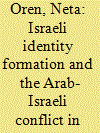

|
|
|
|
|
| Publication |
2010.
|
| Summary/Abstract |
This study focuses on the relationship between national identity and intractable conflict. Abdelal's definition of collective identity that refers to the level of agreement regarding the purposes, practices, relational comparisons with other entities, and narratives that define collective identity was adapted to national identity during intractable conflict and was later applied to Israel's national identity. A review of the Israeli 1969-2006 election platforms shows that in the 1980s and 1990s significant changes occurred in Israel's national identity. The most significant changes included: changes regarding the territorial purpose of Israeli identity; changes in practices on who may become an Israeli citizen; changes of perception of the relationship between Israel and the Arabs; and a growing Israeli acceptance of Palestinian identity. Since 2000, following the failure of the Israeli-Palestinian peace process, some components of Israeli national identity have reverted to their original form. The study indicates that the Arab-Israeli conflict triggered changes in Israel's national identity, but the conflict also seemed affected by changes in that identity. The article connects the changes in Israeli national identity to specific mechanisms and conditions of conflict resolution and reconciliation.
|
|
|
|
|
|
|
|
|
|
|
|
|
|
|
|
| 10 |
ID:
094702


|
|
|
|
|
| Publication |
2010.
|
| Summary/Abstract |
How should researchers treat questions of veracity when conducting interviews in settings rent by large-scale violence, such as war and genocide? To what extent should researchers trust narratives that are generated in politically sensitive contexts? The article argues that the value of narrative data does not lie solely in their truthfulness or accuracy; it also lies in the meta-data that accompany these testimonies. Meta-data are informants' spoken and unspoken thoughts and feelings which they do not always articulate in their stories or interview responses, but which emerge in other ways. This article identifies and analyzes five types of meta-data: rumors, inventions, denials, evasions, and silences. The article argues that meta-data are not extraneous to our datasets, they are data and should be viewed as integral to the processes of data collection and analysis. Meta-data indicate how conditions in the present shape what people are willing to say about violence in the past, what they have reason to embellish or minimize, and what they prefer to keep to themselves. Attending to meta-data is important for responding to informants' fears about talking to a researcher and to ensure informants' safety after the researcher leaves the field. It is also crucial for the robustness of researchers' theories and knowledge about political violence and other political phenomena. The article draws from the author's nine months of fieldwork in Rwanda in 2004, as well as the literature on conflict and violence from political science, anthropology, history, and sociology.
|
|
|
|
|
|
|
|
|
|
|
|
|
|
|
|
| 11 |
ID:
094699


|
|
|
|
|
| Publication |
2010.
|
| Summary/Abstract |
This study analyzes the impact of media framing on aggregate attitudes and expectations of Israelis toward the Oslo peace process with the Palestinians during a time period of eight years (1995-2003). It presents three main contributions: First, it provides a long-term analysis of the impact of media coverage of a peace process on public opinion, while controlling for the influence of real life events. Second, it presents empirical evidence that the strength of media framing effects varies among different facets of public opinion. Specifically, framing effects are stronger on aggregate future expectations compared with their effects on aggregate current attitudes. The fact that the information transmitted by the media evaluative tone was a central source of influence on future expectations underlines the central role of the media in political and social phenomena. Third, in line with previous studies, it shows that the public response to negative framing is much stronger than to positive framing. This may have a negative effect on a government's ability to rally the public in support of a peace process. Since most media coverage of the peace process and conflict focused on negative developments while ignoring positive ones, the media effect on public opinion was that of peace spoilers.
|
|
|
|
|
|
|
|
|
|
|
|
|
|
|
|
|
|
|
|
|